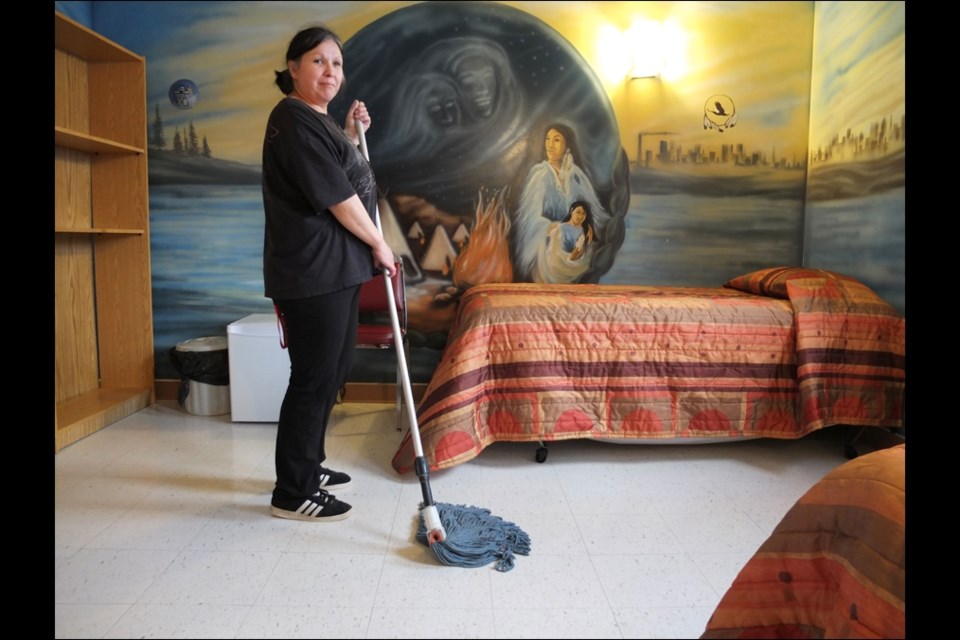Floyd Bighetty is just the kind of person Flin Flon wants to attract.
Hardworking, educated and committed to the region, he relocated to the city in November with dreams of finding a job and his own place.
But as ambitious as Bighetty is, he doubted the small EI cheques he receives would facilitate his move.
Then he learned about accommodations that cost just $30 a day.
“There’s a lot of places in other cities and towns that don’t have these kinds of facilities,” says Bighetty, sitting in the lounge of the
Flin Flon Aboriginal Friendship Centre’s hostel, where he is currently living. “It’s good to have for people that are looking and can’t find a place right away.”
A college graduate whose past jobs have ranged from teaching to heavy equipment operations, Bighetty hopes to leave the hostel as soon as he finds a job.
To many, Bighetty may not seem like a typical hostel tenant. Yet the facility has long served a diverse range of people from across the Flin Flon-Creighton region.
There are moms-to-be from surrounding reserves who need a suite near Flin Flon General Hospital; ill families fleeing mould-filled homes; welfare recipients who can’t find apartments; and low-income students attending post-secondary school.
More recent years have brought a growing influx of homeless people, though the hostel itself is not, as public misconception holds, a homeless shelter.
Then there are the more unexpected uses. A local family showed up at the hostel late one winter night after the heat in their apartment kicked out and they had nowhere else to go.
Hostel manager Dora Parenteau agrees the facility plays an important social role in the community – and rather quietly.
“There would be a lot of people in the community who have no idea how the hostel runs,” she says.
With 11 modest suites on the upper level of the Friendship Centre, the hostel can house up to 28 people if necessary. Each year, the hostel hosts between 2,500 and 3,000 “bed nights” – with each bed night being one person staying one night.
About 40 per cent of tenants are local residents with no permanent home; the remainder come from outlying communities, usually reserves. About 70 per cent of tenants are aboriginal.
Tenant stays range from a single night to several months. In one case, a homeless person spent a full year at the hostel because other accommodations were unavailable.
At $30 a day, the hostel is an affordable option for low-income people, but it’s by no means lavish.
“It’s just very plain. We don’t have phones. It’s not like a regular hotel,” says Parenteau.
Parenteau, who lives in the hostel, strives to maintain a safe environment for tenants. Her no-drug, no-alcohol policy is strict, and anyone who misbehaves is told to leave.
During his two-month stay to date, Bighetty has felt at home and supported at the hostel. He appreciates that tenants who want a job, or their own place to stay, receive referrals to other community agencies.
What is clear from talking to anyone affiliated with the hostel is that Parenteau is a key part of the puzzle.
Originally from The Pas, Parenteau, an aboriginal grandmother who wears dreamcatcher earrings, grew up in various northern Manitoba communities.
Blessed with compassion and strong people skills, she took over as hostel manager a decade ago, not long after hip problems confined her to a wheelchair.
Parenteau views her position as a way to help some of the region’s most vulnerable people.
“You do get sensitive when you see children having hardship,” she says. “Just so many people having hardship and have nowhere to go. I don’t know how to explain it. It hurts you to see that.
“Just last week I had a young couple and they had nowhere to go, and so I let them sleep on the couch. I gave them some blankets. It was just a bad situation. They didn’t even have proper clothing for winter. No mitts, no gloves and just a little jacket. And it was really cold that night.”
As much as she cherishes her job, Parenteau agrees that ideally, there would be no need for a place like the hostel.
“There are so many services in Flin Flon, but there’s always going to be someone that just doesn’t meet criteria for the services,” she says.
When those people slip through the cracks, Parenteau says, the hostel is there to assist with accommodations and, perhaps more importantly in the long term, referrals to other community supports.
“I just want people to know that they can get help at the Flin Flon Aboriginal Friendship Centre hostel,” she says.




